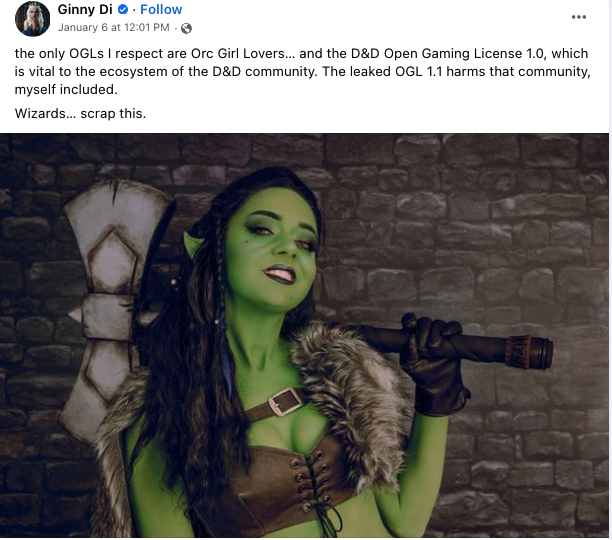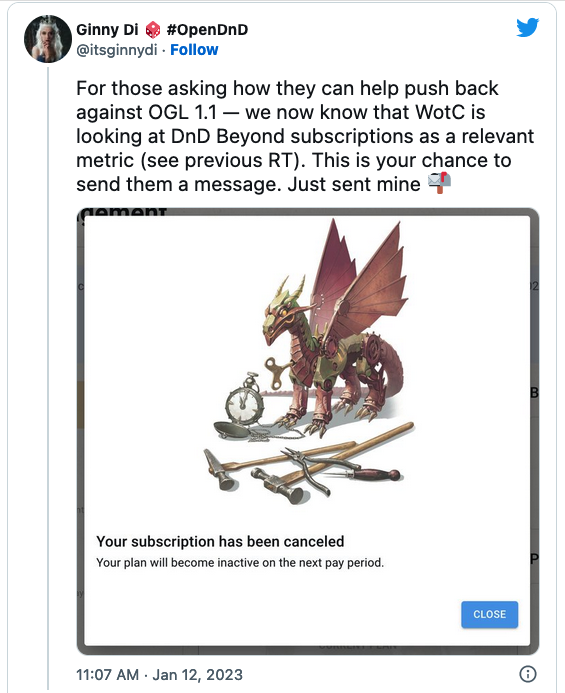If you’re happy that any progress has been made regarding proposed changes to the OGL, thank gender minorities.
Gender minorities were the first ones to break rank and throw down the gauntlet in both breaking the news of a rumored major shift in the Open Gaming License and in leading an opposition to the rumored changes to the OGL that underpins an entire industry of creatives and businesses. It is no surprise really, given that marginalized people have often led the way in situations where others fear retribution.
When no one is offering you a microphone (in the form of inclusion, acceptance, or the networking and connections afforded by those aforementioned privileges) and you expend the effort to claw your way to being heard, a fear of retribution is the least of your concerns. Others may assume that lack of trepidation stems mainly from a desire to preserve a way of earning income, but if that were the case, then everyone affected would have spoken up and spoken out immediately. Clearly it goes beyond monetary gain, after all hundreds of people each day pivot their careers for any number of reasons. The difference is that if one has already seen their concerns tabled, repeatedly being dismissed for no reason other than who they are, then the threat of being excluded for speaking up is not in fact a threat. When one is accustomed to simply being heard, the threat of being disregarded looms large; when being excluded is all you have previously known, it is not an existential crisis, it’s a Tuesday.
When pop culture and gaming journalist, Linda Codega was presented with a leaked version of the alleged updates to the OGL, they could have sat on it. They could have downplayed what it could mean. But on January 5 they boldly broke the story, despite risking access to the information stream they rely on for their work.
The tabletop gaming community reacted in shock. Many publicly stressed the importance of waiting for official verification of the document and its contents. They held private meetings and quietly discussed strategy amongst themselves. The fact of the matter is that the people most concerned about retaliation stayed silent to see how things would play out. The people whose careers could be most affected by the alleged changes were at the same time avoiding publicly discussing the matter, relaying through emissaries that discussions were being had and options considered. But none of the old guard industry leaders made any public moves, no one spoke out about what should be done to oppose the changes. All speculation was about what the alleged changes could mean and how bad it could be and whether it was legal and even the ethics of all of it. But no one was speaking publicly about what, if anything, could be done to oppose any such possible changes.
The community by and large agreed the alleged changes were drastic, unexpected, and could potentially upend the entire third party publisher ecosystem and more. But the community had not yet unified behind a collective course of action, aside from voicing their opinion in various forums and not necessarily directly to Wizards of the Coast/Hasbro.

But while everyone was what-iffing and having these siloed, behind the scenes strategy sessions, and wringing their hands in forums about not rocking the boat, on January 6 tabletop gaming youtuber and personality Ginny Di came out and stated her opposition in no uncertain terms, “Wizards… scrap this.” Di had everything to lose by speaking out, but she also potentially had a lot to lose by staying quiet and seeing where things went. Following her leadership, others started publicly disagreeing with the alleged changes to the OGL.
On January 12, word got out that WOTC/Hasbro were closely watching D&D Beyond subscriptions as a real time unit of measurement. Ginny Di then rallied her vast networks to support a boycott of subscriptions to the D&D Beyond gaming service offered by Wizards of the Coast that was first proposed by gaming content creator D&D Shorts.
The results of the social media multiplier effect culminated in mass cancellations of D&D Beyond subscriptions to the tune of overwhelming the service’s servers.

On January 13 Wizards of the Coast released a statement/apology and has since promised a different revision.
It would not have happened without
Linda Codega and Ginny Di.
Representation matters.
Inclusion matters.
